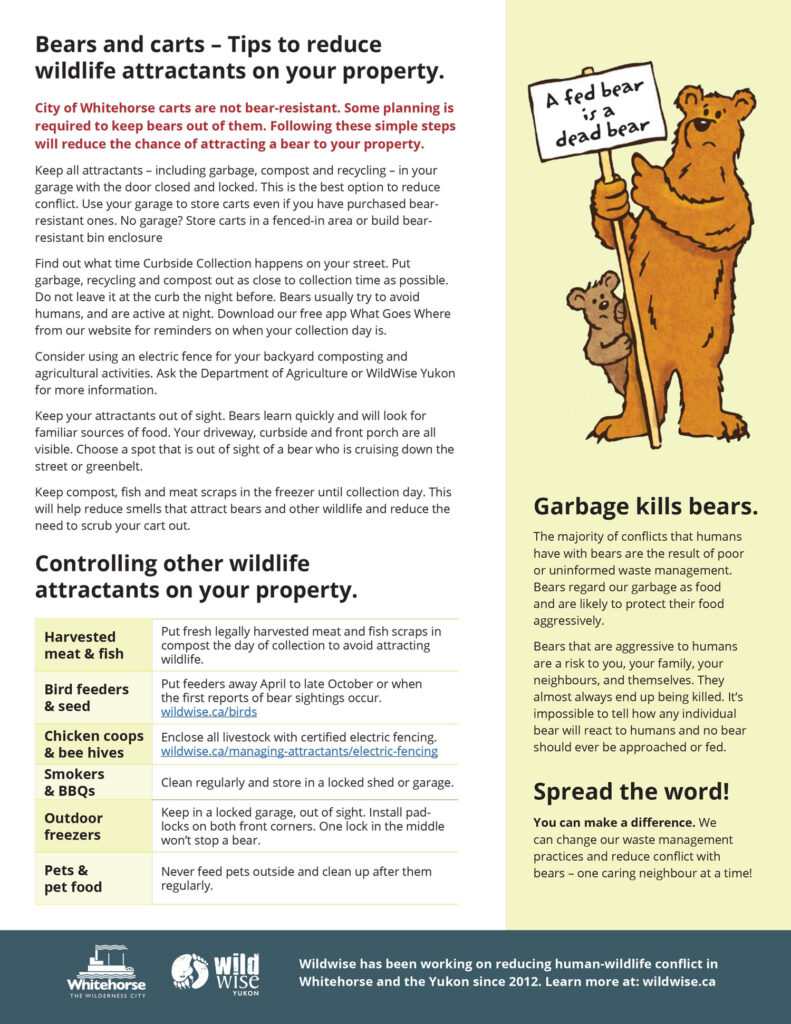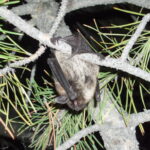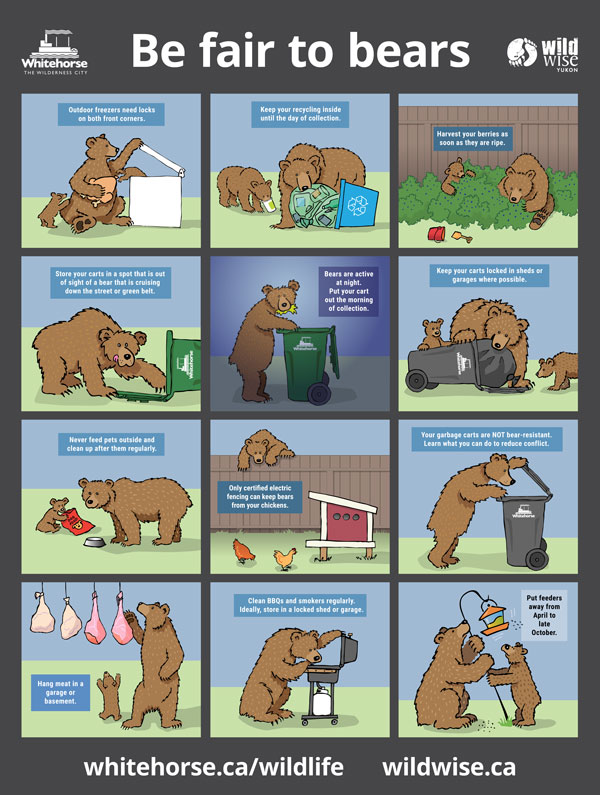Protect Our Wildlife
Whitehorse is surrounded for thousands of kilometres with pristine wilderness, home to wildlife large and small. While many Canadians in the south can only hope to catch a glimpse of a bear while on vacation somewhere else, we’re trying to reduce human-animal interactions where we live, work and play. With this incredible gift of living in close proximity to wilderness comes the collective responsibility to keep it wild. An important part of keeping our wilderness wild is properly managing our waste, as well as other “attractants”. We can do this by being accountable for our waste, prevent illegal dumping or over filling a waste receptacle. Wildlife habituated to waste leads to human-wildlife interactions which could prove deadly for the animal. This includes foxes, coyotes, and bears!
What You Can Do To Protect Wildlife:
- Do not leave waste around the house or garage. The best option is to store organics, waste, and recycling bins in a locked shed or garage until collection day;
- Put your cart out at the curb only on the morning of collection, not the night before;
- Request a lock for your business waste dumpster, and keep waste bins locked at all times;
- Consider storing meat and fish scraps in your freezer until the day of collection;
- Clean barbeques, outdoor kitchens and smokers after every use;
- Install electric fencing around bee keeping, poultry and livestock and keep areas clean of waste;
- Remove any other wildlife attractants from the property;
- In backyard composting do not include meat, fish or pet feces in the product and have the compost in a fenced in area or secured bin;
- Refrain from skinning or tanning hides in your backyard;
- Ensure the preparation, butchering, and processing of legally harvested meat or fish is done within a secured enclosed location to avoid attracting wildlife; and
- Pick all fruit from fruiting plants as they are produced to prevent them from falling and accumulating on the ground.
Bears are active from April to November every year. Most encounters with bears in Whitehorse result from improper storage of household waste. If a bear is given the choice between foraging in the woods and getting an easy meal from a waste bin, it will almost always choose the waste. Once a bear has found an easy meal from a human source, it can become habituated or even dangerous. When bears become habituated they end up being captured or killed. By practicing responsible waste storage practices all of us can reduce the access bears have to our waste, which works towards keeping bears wild.
- No person shall set out waste in any manner or condition that harbours or attracts wildlife;
- No person shall allow waste to spill over or accumulate on any street or adjoining public or private property and shall ensure, at all such times, that all waste is kept within the waste receptacle with the lid fully closed;
- On collection day, the owner of eligible premises shall set out curb-side waste by 7 am, but no earlier than 6 pm on the evening prior;
- The owner of eligible premises shall, by 11 pm on collection day, return the appropriate cart to, and store it on, the owner’s property in accordance with setback requirements as prescribed in the City of Whitehorse Zoning Bylaw;
- No person shall include meat, fish, pet feces or other non-compostable waste in backyard composting.

WildSafeBC and the Interagency Grizzly Bear Committee conduct bear-resistant product testing in North America.
A current list of bear-resistant products, including waste bins, is available on their website.
https://wildsafebc.com/programs/bear-resistant-bin-testing/
Note – while products that pass testing are certified as bear-resistant, this does not guarantee that a bear cannot gain access if given sufficient time.
The Whitehorse Bear Working Group was founded in 2014 and consists of the City of Whitehorse, Yukon Environment, the Centre for Human-Wildlife Conflict Solutions (WildWise Yukon) and an open invitation to local governments, Renewable Resource Council and other stakeholders interested in reducing bear conflicts.
In 2015 the group contracted Wind River Bear Institute to assess bear hazards in Whitehorse. The bear hazard assessment can be seen here: 2015 Whitehorse Bear Hazard Assessment
LIttle Brown Bat

Whitehorse is home to the little brown bat, an endangered species in Canada, and an important part of our ecosystem.
Whitehorse residents can thank the little brown bat for keeping the city’s mosquito population down as the bats feast on a menu of flying insects at night.
In fact, the little brown bat can eat hundreds of mosquitos in just one hour.
Feeding times can be a great opportunity for wildlife viewing. Little brown bats are nocturnal and only leave the roost at night to feed.
To see them in action, stay near the area where they are roosting for about half an hour after sunset. Alternatively, bats may be found after sunset near water where they feed on water and insects.
Residents can be part of making Whitehorse a more bat-friendly community.
Learning about bats and how to coexist peacefully, installing bat houses in your yard and working to protect bat roosts through initiatives like litter cleanups near wetlands are a few ways to help create a more bat-friendly community.
Bat sightings can also be reported to batwatch.ca, a project which monitors bat populations across the country.
If you want to build and install a bat house, plans are available on the Yukon government’s website.
More information on the little brown bat in and other bats identified in the Yukon is available at yukon.ca/en/little-brown-bat .
Report Illegal Dumping at 867-667-2111.
Illegal dumping costs us all! We’ve all seen it at one time or another: garbage, old appliances, broken TVs, mattresses, and other waste items dumped in the bush. Even old freezer meat seems to be “fair game.”
Help keep Yukon wild by reporting illegal dump sites with City limits to Bylaw Services at 867-667-2111 or Environment Yukon’s TIPP line at 1-800-661-0525 for dump sites beyond municipal jurisdiction.
By developing partnerships, having vigilant community members who report illegal dumping, and developing a strategy to manage the problem, we can see results that help to reduce the incidence of this unacceptable practice. Whitehorse citizens and community groups are also working to stop illegal dumping. The City thanks these groups for their hard work and commitment to a cleaner and greener Whitehorse.
Note: Please contact the RCMP at 867-667-5555 if you suspect materials to be explosive or need help identifying explosive materials.
Visit our SWAP Engagement site for an interactive illegal dumping map where you can put a pin-up to submit illegal dumping anonymously! Help keep the wilderness in Wilderness City!
For more information on bears, and reducing negative human-wildlife encounters, visit:

